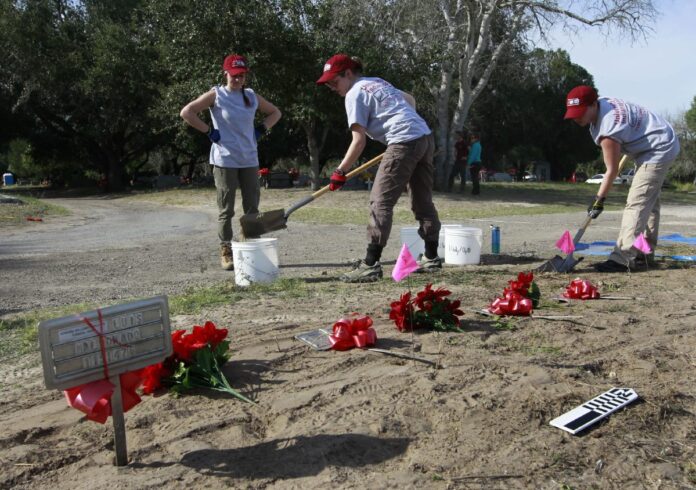FALFURRIAS — More than two dozen anthropology students from Texas and Indianapolis began digging up multiple gravesites at Sacred Heart Cemetery on Tuesday afternoon looking for migrant remains that were buried without proper documentation.
The 31 undergraduate and graduate students from Texas State University and the University of Indianapolis teamed up for their third field season in South Texas where the remains of more than 100 migrants have been exhumed since 2013.
Under the guidance of Dr. Krista Latham, associate professor of biology and anthropology at the University of Indianapolis, they hope to dig up eight plots where unidentified migrants were buried between 2005 and 2009 after a Mission funeral home allegedly failed to extract DNA samples and properly document the contents of each gravesite for future identification.
“We are expecting to dig up the remains of seven unidentified and one identified migrant, but we don’t know what we will find until we start digging,” Latham said.
“Each area of the cemetery that we have worked in has been very different in terms of how the individuals were buried, what they were buried in, the orientation, the depth,” she added. “We went into it with some assumptions that there would be some uniformity to it and there’s not, so we’ve learned to just expect the unexpected.”
In 2013 during their first exhumation, the forensic crews found multiple remains buried in one coffin, others buried in plastic bags, or even in sacks. The news of so-called mass graves brought national attention to Falfurrias and the rising death toll of migrants in the Rio Grande Valley Border Patrol sector which U.S. Customs and Border Protection estimates has surpassed the 1,000 mark in the last decade.
Brooks County Sheriff Benny Martinez, whose deputies tallied 61 migrant deaths in 2016, estimates that for every human remain or body found there are five more lost in the maleza or brush lands of South Texas.
Martinez and Eddie Canales, director of the South Texas Human Rights Center, have been leading the fight for the proper recovery, identification and proper burial of migrants here.
Canales said Brooks County remains the apex of migrant deaths, missing migrants and burials without DNA, and for that reason they are stationed here in hopes of bringing closure to families of migrants who die trying to reach the American dream.
“This has really become the laboratory for best practices,” Canales said. “We are lucky to have collaboration with the justice of the peace, law enforcement, the county and universities that have been doing such great humanitarian work at no cost to the county.”
“With these exhumations we are trying to find everything that has been buried in this cemetery that has had no DNA extracted or on file, because for each one of these remains there is a family that is still searching for their loved one,” he added.
The forensic crew spent most of Tuesday measuring, setting up plots, and doing site preparation under the more than 100-year-old oak trees located on the far east side of the dusty cemetery.
After two years excavating during the summer months, the crew chose to come down in the winter this time and avoid the triple-digit temperatures that scorched them in 2013 and 2014.
Kate Spradley, associate professor at TSU’s department of anthropology, said this year they brought ground-penetrating radar equipment to help them define the perimeter they are digging in and are also setting up a field lab to examine the remains that are exhumed.
“Normally what we do in there would be done at Texas State,” Spradley said pointing to a white-walled tent about 12 feet by 12 feet.
She said many of the remains they’ve found in the their last digs were buried with personal items and burial documents that quickly deteriorate once they are unearthed and the tent will serve as a temporary field lab to keep an inventory of the remains and items they find.
Since 2013, Spradley and her students have recovered the remains of more than 200 migrants in South Texas, including about 114 from the cemetery. She said it would sometimes take years to sort through everything they exhumed during the field sessions, but this new format should help expedite the process.
The forensic crew is scheduled to dig daily from early morning to late afternoon through Jan. 11. They also plan to help Canales upgrade the center’s computer system and write a grant application so he can continue the center’s work in advocating for migrant and human rights.




